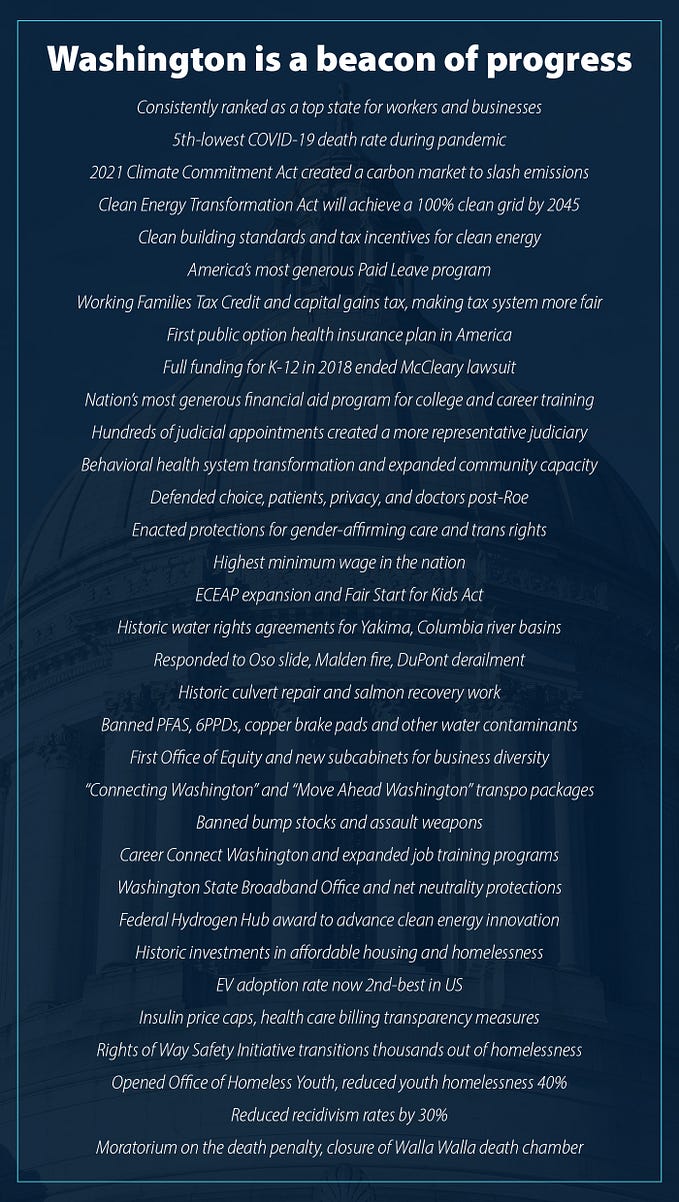Washington state to launch first-in-the-nation health care option for all and new long-term care program
The 2019 legislative session wrapped up with health care legislation that includes two landmark bills. One creates a public option health care plan that works toward health care for all, and another creates a first-in-the-nation long-term care benefit program. Gov. Jay Inslee signed these bills Monday.
“These two bills are models for the rest of the nation to consider,” Inslee said. “Washington state, once again, is at the head of the pack when it comes to policies that help working families and provide much-needed security when it comes to their health care.”

Here’s a breakdown of the bills that will help consumers:
Public option
Inslee signed the first-in-the-nation public option legislation, known as Cascade Care, on Monday in Olympia. The bill, which aims to push against attempts by President Trump and congressional Republicans to undermine the Affordable Care Act, will ensure affordable insurance options for every Washingtonian through the state’s Health Benefits Exchange.
“This is a tremendous accomplishment, “Inslee said. “It builds on work we’ve done over the past several years to expand and protect health care under the Affordable Care Act. This legislation is one way for our state to push back and ensure all Washingtonians have a quality health insurance option they can afford. I believe health care is a right, not a privilege. While our state continues to help lead the national fight for health care for all, this is one way our state is taking action now to ensure affordable care for more people.”
Sen. David Frockt, who sponsored the bill, said Cascade Care is designed to lower premiums and deductibles for families and people purchasing insurance on the individual market.

“Washingtonians need coverage that they can use to stay healthy and to insure that they are not in financial distress if they face a serious health related event,” Frockt said. “This important bill moves us forward in our ongoing effort to provide high quality, more affordable health insurance to every Washingtonian, and I hope it will be an example to other states on what can be done to improve their systems.”
Insurance plans will provide reimbursement rates consistent with 160 percent of Medicare rates that help ensure fair payments for providers and more affordable costs for patients. It directs the state’s Health Care Authority to contract with health plans across the state to offer coverage on the Washington Health Benefit Exchange for anyone in the individual insurance market.
The bill ensures people in every county have access to an affordable plan and strives to make sure that patients spend no more than 10 percent of their income on premiums.
The governor rolled out his plan in January for a public option.

Long-term care security act
Another first-in-the nation bill creates a long-term care benefit, similar to a Social Security or Medicare benefit. Because Medicare doesn’t cover long-term care, the benefit will be crucial for the growing numbers of workers and families who do not have long-term care insurance and find themselves unable to pay for necessary health and care services.
Washington workers pay into the trust through a payroll assessment and are then able to become eligible for benefits that help with a range of daily tasks, ranging from bathing and dressing to taking medicine.

Margaret Gallacher is a 94-year-old Renton resident who attended Monday’s bill signing with her family. She is currently recuperating in an adult home and is experiencing this type of financial hardship after she fell and broke her leg earlier this year. While her healing process is on track, she needs professional care at her adult family home until her leg heals and she feels confident again to live on her own or with her family.
While Gallacher has some modest savings through her pension, she — like a large number of people in similar situations — pays 100 percent of the long-term care costs out of pocket. Medicare doesn’t cover this type of long-term services and support. And Medicaid only covers services for people who have both serious medical needs and don’t have an income or savings.

Like many people growing older, Gallacher receives a lot of support from her family. However, more and more people must also rely on professional caregivers. If this program was available, she would benefit from about one year of long-term care coverage.
Inslee signed several other important bills this session that protect Washingtonians’ access to quality, affordable care.
Upholding the Affordable Care Act
Inslee signed a bill this year that reinforces a significant number of consumer protections in the Affordable Care Act, including the much-discussed right that no person will be denied health coverage because they have a pre-existing medical condition.

The new law addresses unfair practices against consumers, and protects a variety of benefits connected to private health insurance coverage offered in Washington. Among other things, the law includes a requirement that the state offers and explains health plans to any resident regardless of health status. The law also continues open enrollment periods, adds limitations to coverage cancellations, prohibits annual or lifetime limits as well as waiting periods and maintains coverage of the 10 essential health benefits introduced in the Affordable Care Act.
You can read about the ACA bill signing on the governor’s Medium page.
Surprise balance billings
A bill that helps patients avoid surprise balance billings lands on the governor’s desk later this month for bill action. Surprise billings happens when an out-of-network provider treats and bills a patient for an emergency treatment or procedure at an in-network hospital or facility. Not only does a patient have to work through out-of-pocket costs, they also get the ‘leftover bill’ amount for the difference between what the insurer paid and what the non-insurer authorized provider said the service was worth.
Patient Jamie Hansen got surprise billed for more than $110,000 after her son, Ryan, received emergency treatment for a heart infection, among other things.

Although she was told his treatment would be covered, she didn’t realize how little would be covered until she got a bill in the mail.
“This law is going to mean more peace of mind for people,” Hansen said. “Taking the patient out of the equation is perfect. I also think it’s going to give the health plans a little more skin in the game. All you want is it to be more fair and manageable and not ruin your entire life.”
Insurance Commissioner Mike Kreidler requested the bill. He said a consumer protection bill is a step in the right direction.
“Everyone knows someone who’s been hit with a surprise medical bill,” Kreidler said. “I’m talking about people with health insurance who thought they were doing everything right, and still paid a financial price through no fault of their own. I’m pleased that after four years of pushing legislation to end this practice, we finally succeeded with strong bipartisan support. Now, insurers and providers will need to work out their billing disputes and leave the patient out of the middle. I’m grateful to Rep. Eileen Cody for her leadership on this issue and to everyone from both sides of the aisle who voted to end this inherently unfair practice in Washington.”
Here’s a breakdown of some key public health oriented bills:
Opioids
With the opioid epidemic ravaging communities nationwide, research, medical professionals, other experts and evidence prove that medication treatment is the best countermeasure to fight opioid use disorder.
This new law provides comprehensive prevention and treatment options. It also establishes a new clinical treatment standard that supports medication treatment for opioid use disorder. This is the latest action in a multi-year effort that started when the governor issued an executive order and state plan around the issue.

The bill, which received near unanimous support, establishes a statewide treatment program. The program has an emphasis on services for pregnant and parenting women. It also includes an emphasis on law enforcement related diversion programs and treatment for people while they are incarcerated so they have a better chance at treatment when they’re released. The bill includes innovative approaches such as patient education and options with alternative forms of treatment than the use of opioids for pain.
Finally, it mandates the use of electronic prescribing to reduce fraudulent opioid prescriptions. It also requires providers to use the prescription monitoring program to help manage multiple prescriptions and prevent inappropriate ones.

The 2019–21 operating budget provides funding to improve treatment for people who are incarcerated or in diversion programs. There’s a 40% increased risk of opioid overdose deaths for some formerly incarcerated individuals after their release.
The budget will also double the treatment available for pregnant and parenting women — the current waitlist can be as long as four weeks.
Sen. Annette Cleveland said she knows of no other crisis that negatively impacts the health of so many in Washington that is as dire, or as devastating as the opioid epidemic.
“Our communities are reeling from opioid misuse and abuse in too many ways to address with a single solution,” Cleveland said. “This legislation takes action on everything from length of prescriptions and prescription monitoring, to collaboration by multiple state agencies to develop a comprehensive, statewide approach to treating and preventing opioid use disorder. The bill addresses prevention, education, treatment and swift responses to overdoes.”
Tobacco and vaping age and vape tax
The Tobacco 21 bipartisan bill, signed in April at Fred Hutch in Seattle, raises the legal minimum age for tobacco purchases from 18 to 21. It goes into effect Jan. 1, 2020.
Ferguson and the Department of Health requested the bill, which the governor and First lady Trudi Inslee have long supported. The bill was considered in five legislative sessions before being passed this year.

The new law affects the 15- to 19-year-old age group the most. That’s because among adults who become daily smokers, about 90 percent report they first used cigarettes before they were 19, according to a recent surgeon general’s report.
You can read more about the tobacco bill signing on the governor’s Medium page.
The legislature also passed a bill that applies an excise tax to all vape liquids. The bill is scheduled for action next week. The most recent Healthy Youth Survey shows an increase in the number of youth that use these products. Similar for tobacco, evidence shows, like for tobacco, that a higher price and better regulation significantly reduces youth accessing these products. However, this bill also implements a lower tax compared to cigarettes. This is because, for adults, these vape products are potentially less harmful for those who switch from smoking cigarettes.
Foundational public services
The Washington State Department of Health requested a bill that implements Foundational Public Health Services for Washington. While not a governor-request bill, it passed almost unanimously. With this law and associated budget to support local public health infrastructure, the state Legislature took a step forward to shore up the fragile public health system.
This bill helps strengthen the state’s response to environmental public health (like making sure local water systems work) and overall public health systems such as how the state responded to the recent measles outbreak.
Maternal health and tribal health
The Legislature also passed laws to improve maternal health and tribal health outcomes and address some of the significant health care inequities that persist among women and people of color. While not governor-request bills, both bills received strong support.
The maternal health bill sustains a review board to improve maternal health outcomes. The tribal health bill creates a permanent council to focus on tribal health outcomes and improvement. It also provides guidance for a refinancing system. Native Americans experience significantly far worse health outcomes than compared to the general population.











